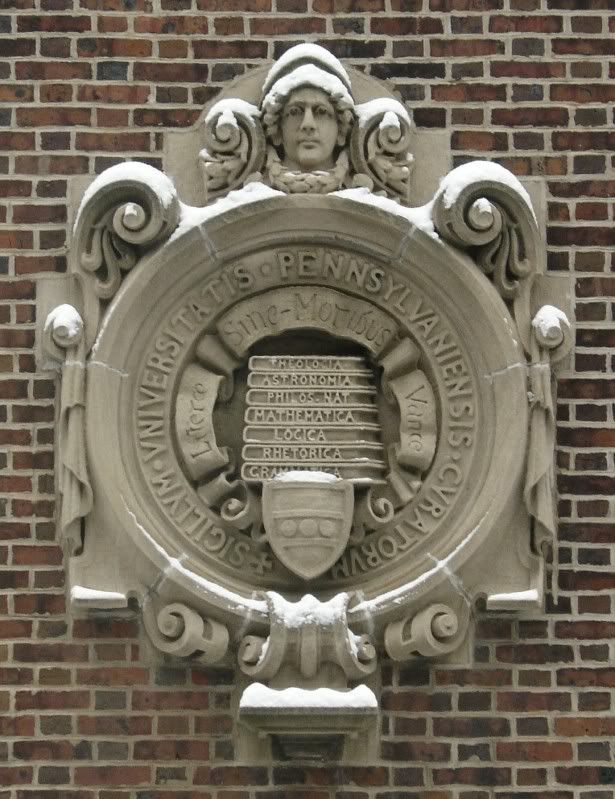more here:
http://www.archives.upenn.edu/histy/fea ... guide.htmlQuote:
The Seal of the Corporation
"The Trustees of the University of Pennsylvania," like other corporations, has an official seal with which signatures to documents issued or authorized by the Trustees are authenticated. The seal is, in effect, the "signature" of the corporate entity and therefore should be put to no other use. It had its origin at a meeting of the Board of Trustees in [1755] with Benjamin Franklin as Chairman, where it was suggested by Provost William Smith and agreed that a seal should be prepared for the use of the Corporation. Though the seal underwent changes over the years, the most recent design, approved in 1932 and adopted in 1933, returned it to virtually its original form.
The seal is composed of seven books stacked on a slanted desk top with the books bearing the following titles in the order listed from top to bottom: Theolog, Astronom, Philosoph, Mathemat, Logica, Rhetorica, Grammatica. On the periphery of the stack of books appears the University motto Leges sine Moribus vanae- in effect, "Laws (or learning) without character are in vain." The entire arrangement is encircled with the inscription Universitas Pennsylvaniensis.
more..
Quote:
HEREFORE, BE IT RESOLVED, That the Committee on University Seal, appointed by the Board of Trustees on Jun 9, 1930, be requested to design a new Seal, to contain the wording and general arrangement of the original Seal of 1755; namely, around the outer border, the words Universitas Pennsylvaniensis, in a minor position the original quotation Leges sine Moribus vanae, in the center, on a desk or table, a pile of seven books marked as follows:
THEOLOG
ASTRONOM
PHILOSOPH
MATHEMAT
LOGICA
RHETORICA
GRAMMATICA"
even more...
Quote:
The word literae cannot be substituted for leges without doing obvious violence to the famous quotation. The substitution does not seem to us necessary or, indeed, even desirable. The sense of the passage in Horace is, 'Of what avail are empty laws without (good) mores?' This was said by Horace in the light of Augustus' attempt to lead the Roman people back to the ways of life that had made and kept them great, and probably reflects the thought Ennius expressed in the line, moribus antiquis res stat Romana virisque (the Roman state is founded on its ancient mores and its men).






 --
--